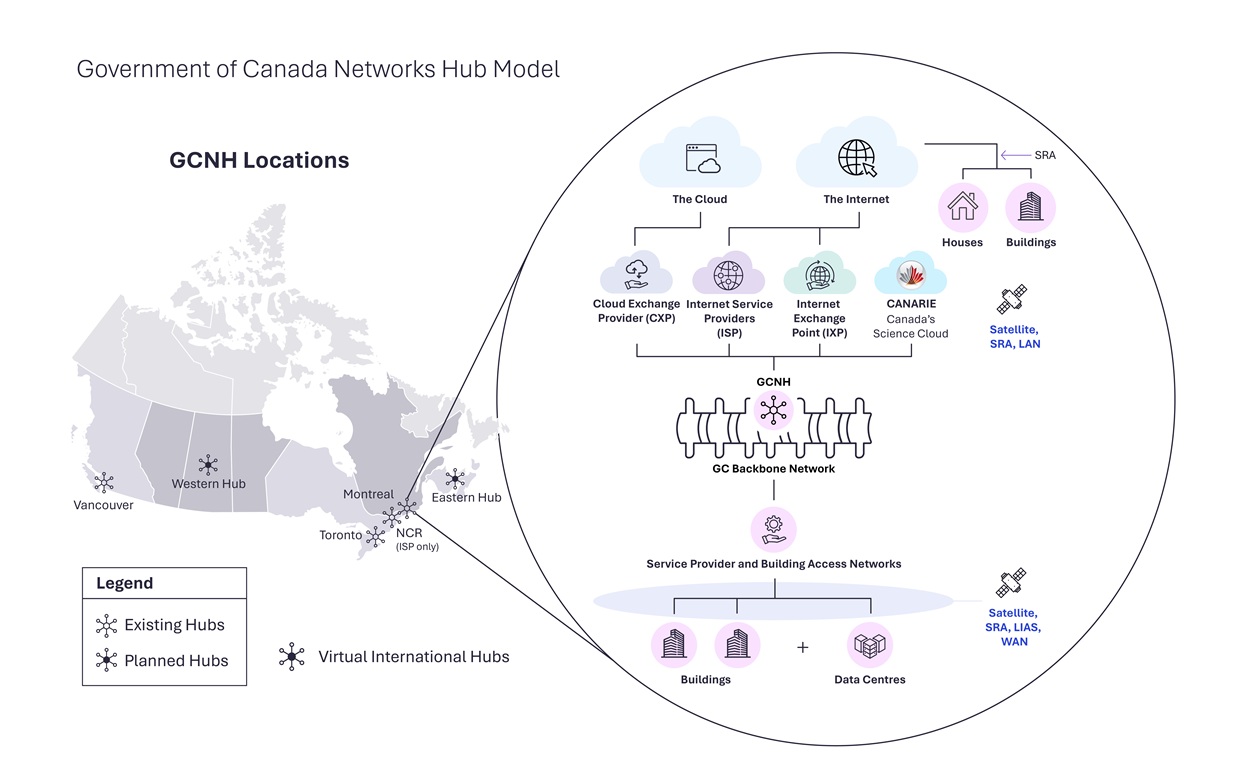Delivery model
Government of Canada Networks Hubs
Since 2023, Shared Services Canada (SSC) has been using a GC Networks Hub (GCNH) model that leverages software-defined network infrastructure to automate traffic flow and maintenance. This improves connectivity manageability and performance to enable the Government of Canada’s Cloud Adoption Strategy.
In the former GC Network configuration, buildings and legacy data centres connected to partner, client or global networks (of which there were more than 50) through satellite, secure remote access (SRA), local area networks (LAN) or wide area networks (WAN).
Before, partner and client networks, as well as enterprise data centres, connected to the GC Backbone Network. The GC Backbone connected to the Internet and the cloud through enterprise perimeter security firewalls to an enterprise Internet service. Staff working from home and elsewhere connected to the Internet through SRA.
Now, in regions across Canada, connectivity service providers will link GC buildings and legacy data centres to the GC Backbone at a GCNH. Each GCNH also provides the connectivity externally between the GC Backbone and the cloud, Internet and Internet exchanges.
SSC has already installed GCNHs in Toronto, Montréal and Vancouver, and is upgrading and expanding the National Capital Region (NCR) hub that provides Internet access only. Additional GCNHs are being considered for the Prairies and the Maritimes in the future. SSC is also looking at establishing virtual international hubs to support the Government of Canada’s work around the globe.
There are several benefits to this approach.
- It improves the speed and quality of connections because data won’t have to travel as far. This means better user experience across the country, particularly in areas farther away from the NCR.
- It improves network efficiency by reducing the amount of data travelling through the core network in the NCR.
- It creates connectivity redundancy so that, if needed, traffic can be rerouted through another GCNH to reduce downtime for users.

Government of Canada Networks Hub Model - Text version
A map depicts the locations of 6 Government of Canada Networks Hubs (GCNH) across Canada. From west to east:
- Vancouver (existing)
- Western Hub located in the Prairies (planned)
- Toronto (existing)
- National Capital Region (NCR) (existing – Internet access only)
- Montréal (existing)
- Eastern Hub located in the Maritimes (planned)
Virtual international hubs are also planned.
An enlargement is shown of the GCNH model:
Buildings and data centres connect to service provider and building access networks via satellite, secure remote access (SRA), LIAS and WAN.
The service provider and building access networks connect to the GC Backbone Network, on which sits a GCNH. The hub connects to:
- Cloud exchange provider (CXP), which connects to the cloud
- CANARIE, which is Canada’s Science Cloud
Internet service providers (ISP) and Internet exchange providers (IXP), which connect to the Internet. Houses and buildings connect via SRA through the Internet to the GCNHs. Connections for all of these services are also possible through satellite, LAN and SRA.